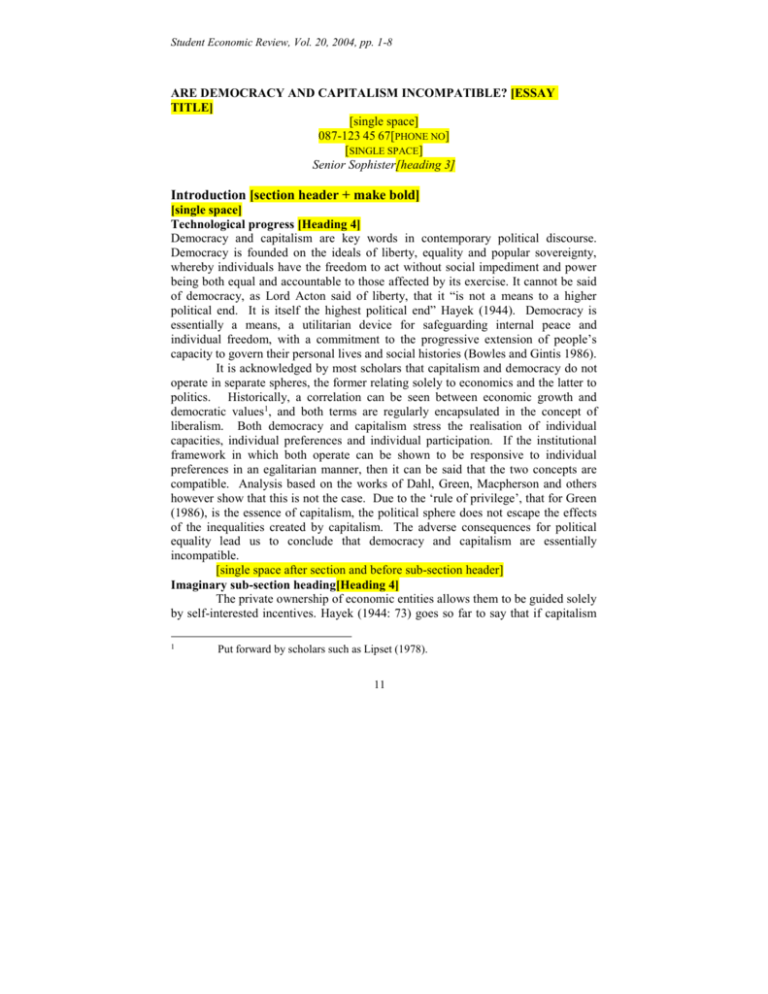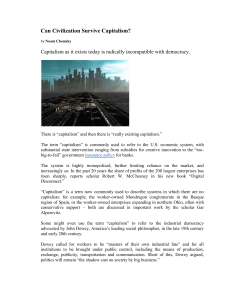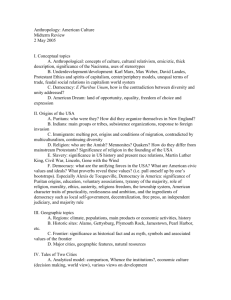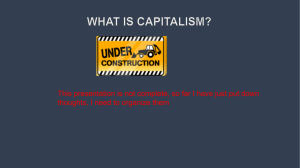essay_template
advertisement

Student Economic Review, Vol. 20, 2004, pp. 1-8 ARE DEMOCRACY AND CAPITALISM INCOMPATIBLE? [ESSAY TITLE] [single space] 087-123 45 67[PHONE NO] [SINGLE SPACE] Senior Sophister[heading 3] Introduction [section header + make bold] [single space] Technological progress [Heading 4] Democracy and capitalism are key words in contemporary political discourse. Democracy is founded on the ideals of liberty, equality and popular sovereignty, whereby individuals have the freedom to act without social impediment and power being both equal and accountable to those affected by its exercise. It cannot be said of democracy, as Lord Acton said of liberty, that it “is not a means to a higher political end. It is itself the highest political end” Hayek (1944). Democracy is essentially a means, a utilitarian device for safeguarding internal peace and individual freedom, with a commitment to the progressive extension of people’s capacity to govern their personal lives and social histories (Bowles and Gintis 1986). It is acknowledged by most scholars that capitalism and democracy do not operate in separate spheres, the former relating solely to economics and the latter to politics. Historically, a correlation can be seen between economic growth and democratic values1, and both terms are regularly encapsulated in the concept of liberalism. Both democracy and capitalism stress the realisation of individual capacities, individual preferences and individual participation. If the institutional framework in which both operate can be shown to be responsive to individual preferences in an egalitarian manner, then it can be said that the two concepts are compatible. Analysis based on the works of Dahl, Green, Macpherson and others however show that this is not the case. Due to the ‘rule of privilege’, that for Green (1986), is the essence of capitalism, the political sphere does not escape the effects of the inequalities created by capitalism. The adverse consequences for political equality lead us to conclude that democracy and capitalism are essentially incompatible. [single space after section and before sub-section header] Imaginary sub-section heading[Heading 4] The private ownership of economic entities allows them to be guided solely by self-interested incentives. Hayek (1944: 73) goes so far to say that if capitalism 1 Put forward by scholars such as Lipset (1978). 11 22 CAPITALISM AND DEMOCRACY means a competitive system based on free disposal over private property and economic entities, that only within this system is democracy possible. Decisions are made without central direction but the ‘invisible hand’ of the market serves to coordinate and control. As a result goods and services are produced ‘much more efficiently than any known alternative’ (Dahl 1998: 167) and long run capitalism has typically led to economic growth. 2 By cutting acute poverty and improving living standards, economic growth helps reduce social and political tension. Growth also provides more resources, that are available should conflicts arise as well as to provide individuals, groups and governments with resources for education which helps foster a literate and educated citizenry. Market capitalism is also favourable for democracy because of its social and political consequences. A large middle stratum of property owners are created, that Dahl sees as typically seeking education, autonomy, personal freedom, property rights, the rule of law, and participation in government. The middle classes are the ‘natural allies’ of democratic ideas and institutions, as Aristotle first said. On this topic Bealey quotes Schumpeter, who argues that the rationalist scheme on which classical democracy rests is essentially bourgeois in origin. Milton Friedman (1962) points out the social benefits of the anonymity of exchange and the irrelevance of identities prevalent in the capitalist system. No one who buys bread knows whether the wheat from which it is made was grown by a Communist or a Republican, by a Constitutionalist or a Fascist, or for that matter, by a Negro or a White. This Friedman calls the staple of the liberal identification of capitalism and freedom. (two spaces before a main section header) Section Heading [Heading 5] [single space after a section header] Produce serious political inequalities among citizens. This presents ‘a formidable and persistent challenge to democratic goals and practices that existed throughout the twentieth century and continue into the twenty-first. This is apparent within the state and globally, ‘free trade’ not turning out to be the means of linking the nations of the world together peacefully and democratically in the way it was forecast to. Liberalism increasingly appears an ‘apologia for economic privilege’ (Bowles & Gintis 1986: 11). 2 It is not true to state forthright that economic growth is unique to democratic countries, and as Dahl himself points out: ‘There appears to be no correlation between economic growth and a country’s type of government or regime’ (Dahl 1998:170). Bealey (1993: 221) states non-democratic capitalism is as common as democratic capitalism and points to Taiwan and South Korea as examples of non-democratic countries with high growth rates. Huntington (1991) however contains that economic growth is unfavourable to nondemocratic regimes, often undermining their legitimacy in the long run. SARAH LEWIS 33 Both capitalism and democracy were revolutionary ideas, portending the breakdown of the old order of mercantilism, dynastic monarchy and repression of spoken and written thought. They signalled the end of the Ancient Regime and the rise of the common man. They can, therefore, both be regarded as aspects of ‘liberalism’, an umbrella term associated with so many of the radical notions of the nineteenth century (Bealey 1993). One may therefore maintain that these notions were part of a process of ‘modernisation’, however democracy and capitalism remain very much opposed at the grass roots level. [two spaces before References] References [Single space after references] PLEASE SEE SECTION OF WEBSITE RELATED TO REFERENCING







